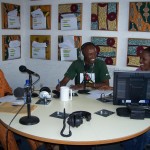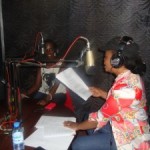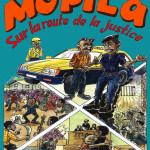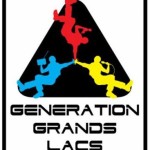SFCG addresses conflict mining at the local level

Photograph of Congolese miners at a gold mine in Montgbawalu, Ituri district, eastern Congo. September 8, 2005 (REUTERS/Jiro Ose)
By Audra Gustin, with assistance from the SFCG DRC Country Staff
The presence of vast mineral resources plays a key role in the conflicts that devastate Eastern Congo. The informal nature of the mining sector allows armed groups to finance their operations via the sale of conflict minerals.
Currently in the U.S., the Dodd-Frank bill requires Wall Street companies to trace the origins of their minerals and ensure that they are conflict-free, thus impeding the activities of dangerous armed groups. However, if the law is not followed, there is a risk that Congolese minerals could be banned entirely, which would devastate the local economy. SFCG is therefore undertaking steps to support the implementation of the law at a local level.
SFCG has entered into a partnership with Pact, a capacity-building NGO, in order to contribute to civilian protection and the eradication of conflict mining in the DRC and Rwanda.
The project will inform the local population, mining communities in particular, of the importance of being able to trace minerals, and encourage those who currently profit from the sale of conflict minerals to instead conform to the new law. The project aims to empower communities in denouncing human rights abuses along the supply chain in the DRC and Rwanda, and to claim their right to protection.
The project activities include all forms of media from radio soap opera, posters and brochures to comic books. In total, there will be:
- 50 radio soap opera episodes in the DRC and 50 in Rwanda;
- 1,400 posters on human rights violations regarding women and children working in the mines;
- 2,000 posters on tracing and certifying minerals;
- 2,000 brochures explaining the mechanisms of traceability and the certification of minerals, to be distributed to miners, transporters and traders;
- 2,000 brochures in Swahili on mining codes, taxation, and relevant policies; and
- 32,300 comic books on good governance in the mining sector, the traceability and certification of minerals, and how to combat human rights abuses. These comics will be distributed in mining areas and at national borders.
Audra Gustin, a student of intercultural communication, is finishing her M.A. in International Communication from American University. She is currently an intern with SFCG’s Communications Department in Washington, DC.








